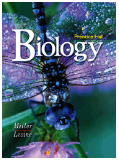BIOLOGY
by Miller & Levine
[complete Table of Contents]

|
Use the pull-down menu to jump to any of the Book's 40 Chapters: |
Additional Chapter 14 Resources:
Gateway
to the Human Genome
Our special guide to searching the human genome, including a "Scavenger
Hunt" for your students to use in exploring the genome.
A
Human Genome "Top Ten" List
Ten things about the human genome that we'll bet you didn't know!
"The
Biotech Death of Jesse Gelsinger"
A moving article from the NY Times Magazine about a tragic death associated
with a gene therapy experiment

In this chapter, students will read about the basic principles of human genetics and the organization of the human genome, as well as techniques for manipulating DNA, including the production of recombinant organisms. Students will also be introduced to some of the technology being used to study and manipulate human DNA and some of the anticipated applications of this technology
| Hot Links | |
| Take it to the Net | Teaching Links |
What are Web Codes? |
Web
Codes for Chapter 14: |
![]()
Section
14-1: Human Heredity
![]() All egg cells
carry a single X chromosome (23X). However, half of all sperm cells carry
an X chromosome (23X), and half carry a Y chromosome (23Y). This ensures
that just about half of the zygotes will be 46XX (female), and half will
be 46XY (male).
All egg cells
carry a single X chromosome (23X). However, half of all sperm cells carry
an X chromosome (23X), and half carry a Y chromosome (23Y). This ensures
that just about half of the zygotes will be 46XX (female), and half will
be 46XY (male).
 In both cystic fibrosis and sickle cell
disease, a small change in the DNA of a single gene affects the structure
of a protein, causing a serious genetic disorder.
In both cystic fibrosis and sickle cell
disease, a small change in the DNA of a single gene affects the structure
of a protein, causing a serious genetic disorder.
Section
14-2: Human Chromosomes
 Males have just one X chromosome. Thus,
all X-linked alleles are expressed in males, even if they are recessive.
Males have just one X chromosome. Thus,
all X-linked alleles are expressed in males, even if they are recessive.
 Nondisjunction causes gametes to have
abnormal numbers of chromosomes, which in turn causes a chromosome number
disorder.
Nondisjunction causes gametes to have
abnormal numbers of chromosomes, which in turn causes a chromosome number
disorder.
Section
14-3: Human Molecular Genetics
 The Human Genome Project is an attempt
to sequence all human DNA.
The Human Genome Project is an attempt
to sequence all human DNA.
 In gene therapy, an absent or faulty
gene is replaced by a normal, working gene.
In gene therapy, an absent or faulty
gene is replaced by a normal, working gene.
Insights
into the Human Genome
A page of facts and figures about the Human Genome Sequencing Project.